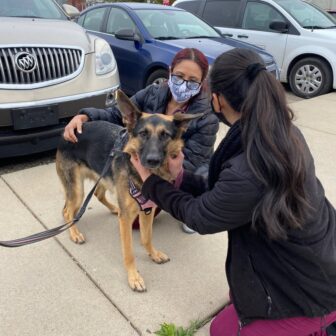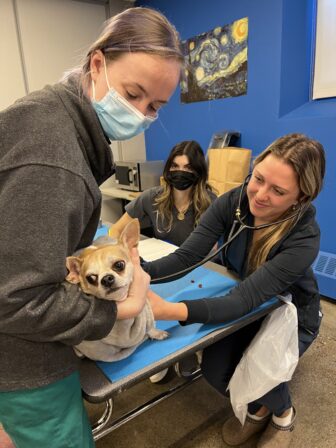
Pit bull at a mobile clinic in Detroit. IMAGE: Street Dog Coalition
By Vladislava Sukhanovskaya
Requests for help for pets of homeless people are rising compared to the previous year and nonprofits are there to help.
The Humane Society of Huron Valley in Ann Arbor, Michigan, plans to launch a low-cost and free mobile clinic for people who can’t afford veterinary care for their pets, said clinic director Gary Evans.
Evans talked about an elderly man with an American flag whom he saw every day on the way to work with his old Pomeranian – “a pair that’s been together for quite some time and have quite a deep bond.”
The person was collecting money next to a highway ramp and one day popped up in Evan’s clinic.
“He told everybody about his dog. He clearly loves his dog because he’s literally always there next to him on the side of the ramp.”
Evans continued, “We were able to provide some help. And I get a very happy wave now whenever I see him, so it’s just one of those small world kind of connections that were not only helping somebody in need, but was very personal because it was somebodyI don’t know at all, but see five days a week.”
The Humane Society of Huron Valley is one of the largest shelters for pets in Michigan and operates in Washtenaw County.
It provides free and low-cost veterinarian care. It plans in the next year to expand help for homeless people and reach them with mobile clinics, communications director Wendy Welch said.
Additionally, the organization wants to distribute free jackets as colder weather is here.
“I ran into one gentleman who was living in a tent just outside a homeless shelter with a large breed dog that had short fur,” said Cameron Greig, the manager of the organization’s Bountiful Bowls pet food assistance program.
“For a dog like that, any type of fleece jacket blanket is helpful. And I’d like to develop a little bit of a stockpile for when those situations arise,” Greig said.
People who experience homelessness can’t simply take pets with them and live in a shelter because only service animals are generally allowed.
Daniel Kelly, the director of the Shelter Association of Washtenaw County, told about a homeless veteran in a wheelchair who had been staying with a service dog.
He said, “The dog was often working, so you couldn’t pet him. But it was a pretty warm experience. We all enjoyed that. And it was exciting.”
Kelly added, “He moved into his own permanent home a few months ago with his dog and got a little pet bed and everything.
“I haven’t seen him since, which is usually a good sign. If we don’t see a person anymore, it usually means they’re doing well,” he said.
Shelters’ main challenge is limited space, and that’s why they can’t accommodate pets.
“I would love to have a better solution,” Kelly said. “But it comes down to capacity.
“When you compare that to, like, can we bring somebody in who’s being discharged from the hospital, who needs help with their leg being amputated, do we have the medical staff necessary to meet that person’s need?”
“I hate to say it, but we prioritize that over whether someone can bring their pet in,” he said.
Another project that assists pets of homeless people is VeTouch, based in Minneapolis.
Every first Sunday of the month, vet students from the University of Minnesota treat pets of low-income and homeless people for free. The clinic’s focus is preventative care, such as rabies vaccines.
Jared Mackey, a third-year vet student, told of a woman with two Yorkies and a cat. One had a liver problem, so the veterinarian made recommendations on how to take care of it
The woman told her veterinarian that “she had never experienced such incredible care.”

German shepherd at a mobile clinic in Detroit. Image: Street Dog Coalition
She said her mom told her that poor people shouldn’t have animals and was grateful that the vets didn’t validate that point.
Mackey remembers her saying, “I’ve been on and off living in the car for the past couple of months. And I’ve been sleeping in the car with my kitties so they don’t have to be out there in the cold alone.”
Mackey called it “heart-touching.”
Now that woman is in an assisted living facility and not living in her car anymore.
“She mentioned that her pets are her life, and they’ve helped her get through the cold nights in Minneapolis, which are so brutal. Hearing about how pet care has helped her mental health and her life is also pretty inspiring and eye-opening,” Mackey said.
National nonprofits support the same mission in the Great Lakes area by providing veterinary care and food.
Feeding Pets of the Homeless, based in Carson City, Nevada, says 14% of the animals it helps are cats and 85% are dogs. Pit bull terriers and chihuahuas are the most common breeds, said Genevieve Frederick, the organization’s founder and president.
She said 61% of the homeless owners the organization serves are women nationally.
“Women will use these dogs, even the small ones, as protection because the streets are so dangerous,” Frederick said. “So the dog will alert that person that something dangerous is coming.”

Physical examination. IMAGE: VeTouch
“Or if they’re in their tent, they will try to protect their area and their human. That animal-human bond is so prevalent with the homeless because those animals are with their people 24/7,” Frederick said.
She added that homeless people often feed their pets first and only then eat themselves.
“There’s a lot of people out there that, if they had to choose to go into homelessness with or without their pet, they would take that pet with them, because they’re part of their family,” said Frederick.
The Street Dog Coalition, based in Fort Collins, Colorado, operates in 50 cities, including Buffalo, Chicago, Detroit, Ithaca, Syracuse, Minneapolis and Pittsburgh.
Executive director Katrina Weschler said the coalition has local branches that open a free veterinary clinic at least four times a year to make sure patients get a follow-up. Some clinics operate monthly.
Street clinics pop up in homeless day shelters, parking lots, parks, church basements and homeless encampments.
In the Great Lakes area, the coalition helped more than 355 people and 500 pets in 2022, according to its statistics.
“There is definitely a rise in the number of requests for help compared to previous years, especially since the pandemic,” said Weschler.
According to Frederick, Feeding Pets of the Homeless helped 20 animals the previous year and this year the number is 75 in the Great Lakes region.
A major goal of such organizations is to prevent diseases and keep pets with their owners because shelters for pets are usually full.
“A lot of times, folks might also feel a little trepidation. Like, ‘are you trying to take this pet away from me?’ You want to clear the air right away, establish that is not at all our goal. We want to keep people and their pets together at all costs,” Weschler said.
Frederick said common medical conditions are traumas, infections and dental problems.
Pets are also hit by cars, shot and stabbed. They also need prevention and treatment for diseases like canine parvovirus and heartworm, and the clinics also offer spaying and neutering.
“In the last 12 months, the average invoice from a (veterinary) hospital was $542. We have paid over 1,800 invoices at over $1 million in the last 12 months,” said Frederick.